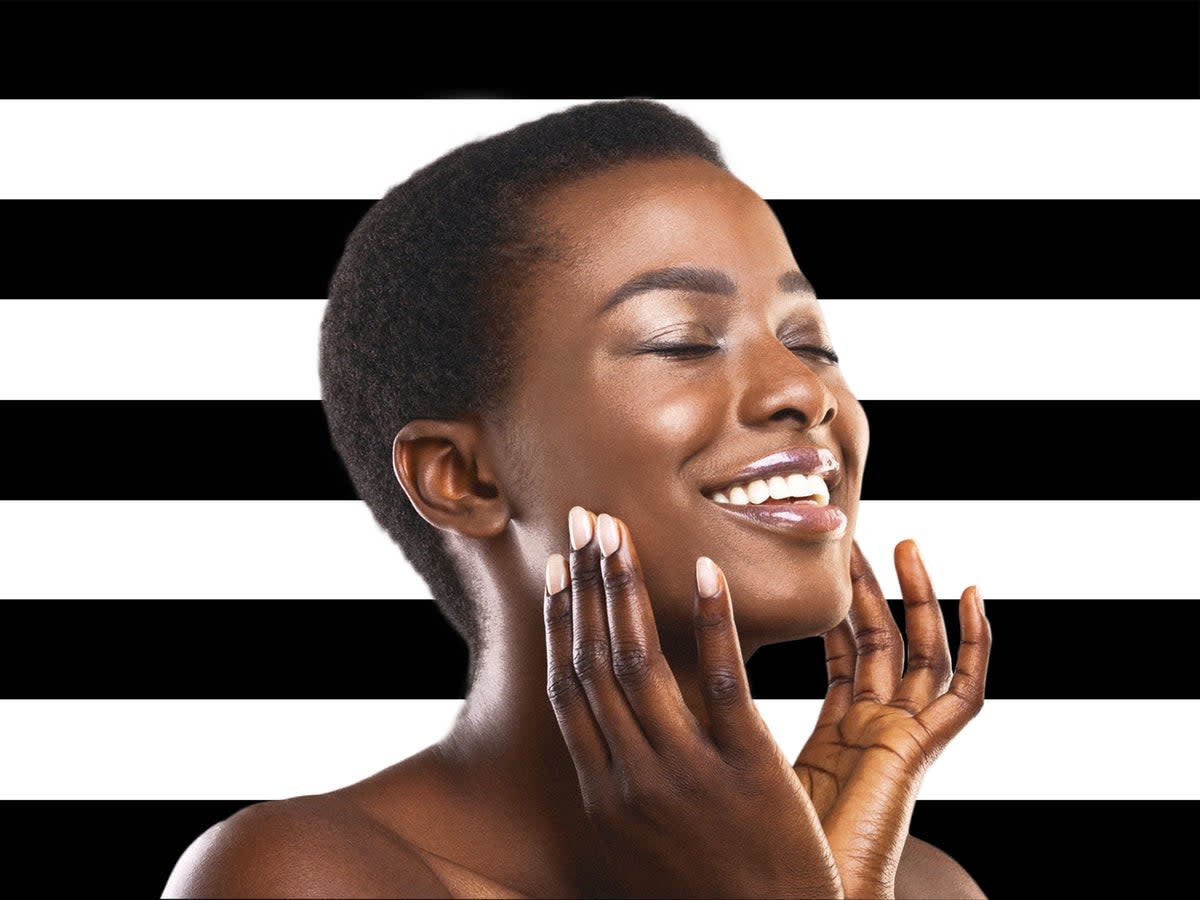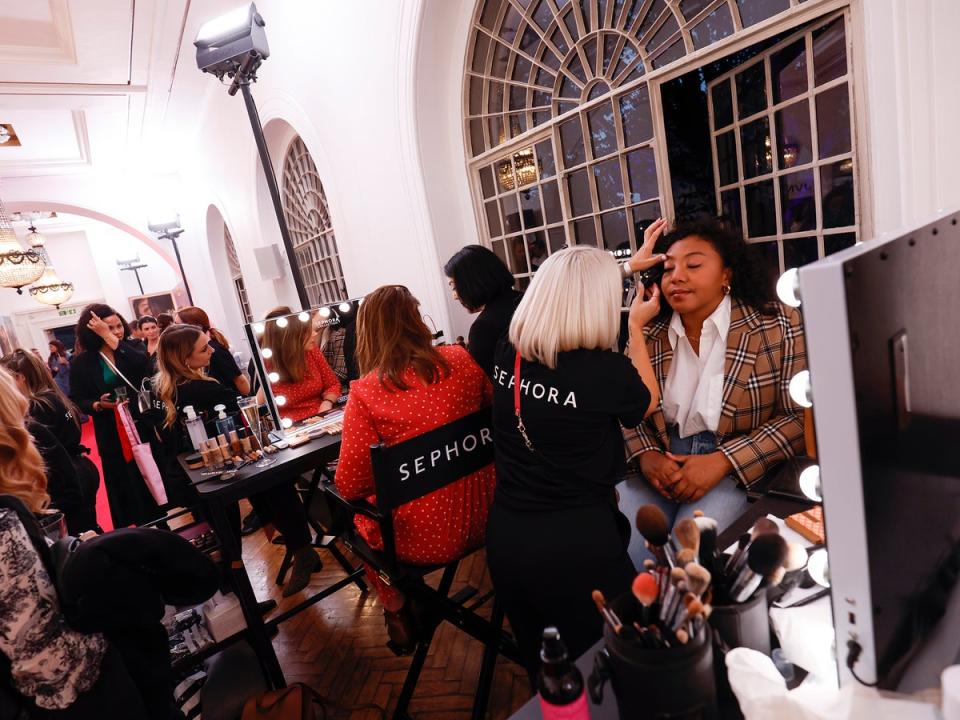‘Sephora is the real reason to visit the States’: How a cult beauty brand became a UK obsession

I booked a trip to Barcelona from the UK just to visit Sephora,” admits British beauty expert Marina Mansour. “Sephora has locked itself into this cultural position that says, ‘If you’re that girl, then you’re shopping at Sephora.’ It’s the equivalent of walking around with an Abercrombie & Fitch bag back when it was popular.”
Trekking across Europe just to visit what’s essentially a supersized beauty playground seems a bit excessive, right? But Mansour and her fellow British Sephora fans will swear that it’s completely worth it. Any beauty addict will remember the first time they entered Sephora’s black, shiny hallowed halls, or the first time they coerced a friend to bring them back a Sephora memento from their holiday. There are currently more than 2,700 Sephora stores worldwide, each one a glittery, futuristic beauty emporium for make-up fanatics, selling more than 250 cosmetic brands under one roof. And for Sephora’s British fans, it’s a huge upgrade from our high street drugstores like Boots and Superdrug, where the choice of brands and product ranges are limited in comparison.
It’s been 17 years since Sephora closed all of its UK stores, having failed to match its competitors on the British high street, but the internet has since radically shifted the beauty landscape. The company’s French owners have announced plans to make a British bricks-and-mortar comeback in spring 2023, while this week saw the retailer open an online store exclusively for UK customers. Many long-time fans immediately went into their overdrafts as a result, but few were complaining.
During those nearly two decades of absence, Sephora’s grip on the UK beauty community has only tightened. Fans are known for making pilgrimages to international stores armed with extensive shopping lists. Many would regularly post on social media pleading for the retailer to reopen in the UK. “We’ve heard whispers for years in the beauty community suggesting that Sephora is coming back, everyone gets excited, then it doesn’t happen,” says beauty blogger Sharon Harvey. “It’s become this iconic thing that we want but can’t have.”
Sephora was founded in Limoges, France, by Dominique Mandonnaud in 1969, though it was then known as Shop 8. By the end of the Seventies, its name had been changed to Sephora, and LVMH (the world’s leading luxury goods group) acquired the brand in 1997. That was the same year their cult Champs-Élysées flagship store was opened. A year later, Sephora landed in Soho, New York, and expanded across the USA and Australia.
But it’s the glossy American sheen to Sephora’s identity that has been most alluring to British beauty fans (Sephora’s presence is largest in the US, where it has 1,125 stores). For teenagers who grew up watching prolific British beauty vloggers like Zoella and Sprinkle of Glitter in the 2010s – and who often reviewed American products – shopping in Sephora brought you one step closer to being “that girl”, as Mansour puts it. “If you grow up in the UK, there’s a real shininess to the US that pulls you into that world,” she says. “It’s the sort of thing everyone wants to be connected to. Sephora is a lifestyle … Starbucks has that effect [too].”
Millie Kendall, who serves as CEO of the British Beauty Council, recalls deciding to go on overseas work trips solely for a chance to visit one of their stores. “[It’s] an excuse to go,” she admits. “You tend to get an invitation to go somewhere for work, you might not want to go, but a trolley dash in Sephora will justify the trip. For a lot of people in the British beauty industry, Sephora is the real reason for visiting the States.”
It also means that the brand’s signature shopping bag has become a cult status symbol over the years. “There’s nothing quite like bringing that black and white striped bag back from holiday,” says Harvey. So it was welcome news for both her and her 10,000 followers when Sephora revealed its forthcoming return. “When Sephora announced its relaunch in the UK, a lot of my followers were telling me that having Sephora back in the UK will be like having a piece of holiday at home.”
The rise of the “beauty YouTuber” has also been instrumental to Sephora’s mystique. As job titles like “influencer”, “content creator” and “vlogger” became increasingly commonplace, Sephora benefited from masses of free and sponsored promotion from creators. Modern YouTube is filled with videos of hauls, unboxings, product reviews and make-up tutorials using products only stocked in Sephora. “We’ve seen all the products that we can’t have,” says Harvey. “It’s added to a hype that hasn’t gone away.”
Some of the most notorious videos include one in which American beauty guru James Charles frantically runs around a Sephora store creating a full make-up look using only tester products in 30 minutes. It’s been viewed more than 11 million times since it was posted in 2018. Unboxings by influencers such as Jaclyn Hill and Laura Lee have also led to merchandised hysteria, with make-up fanatics dropping hundreds of pounds on imported Sephora items (a survey from Fragrance Direct found that the average woman in the UK spends nearly £500 on beauty products a year).

On TikTok, the “Sephora Haul” tag currently has more than 500 million views. As you scroll down the page, thumbnails show a flock of beauty vloggers holding up their striped Sephora bags up to the camera, raving about cult classic brands: Tarte, Makeup by Mario, Too Faced, MILK Makeup, Pat McGrath. Then there’s Sephora’s infamous own-brand products like its face masks, eyelash curlers and cream blushes. In short, with the help of beauty content and influencers, Sephora’s cult has been galvanised, and the brand has been unofficially crowned the most elite make-up shopping destination in the world.
“It’s a make-up playground,” adds Kendall. “From a merchandising perspective, it feels energetic and completely modern – it’s always ahead of the pace. What’s so exciting is that if you’re really into beauty, it’s all there for you. It’s unlike anything we have in the UK.”
The uninitiated won’t get it, but there’s something undeniably special about Sephora arriving on British shores. The striped bags. The most coveted make-up drops. No more living vicariously through James Charles. And now all without the price of a plane ticket.

